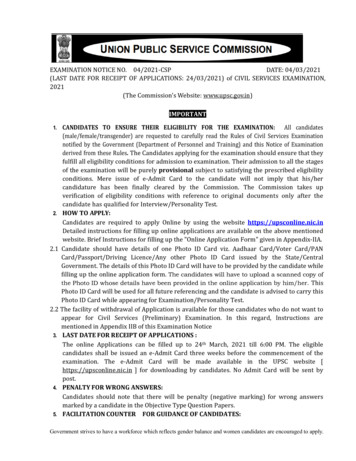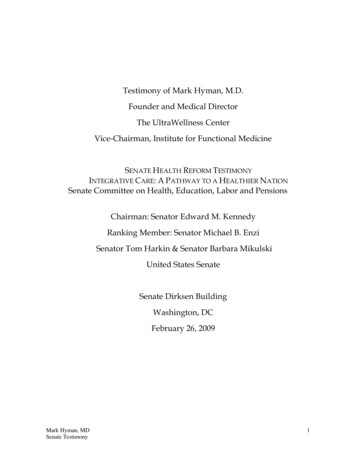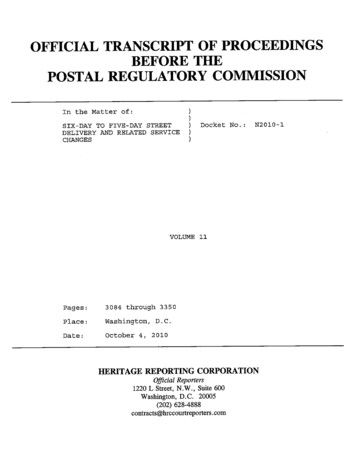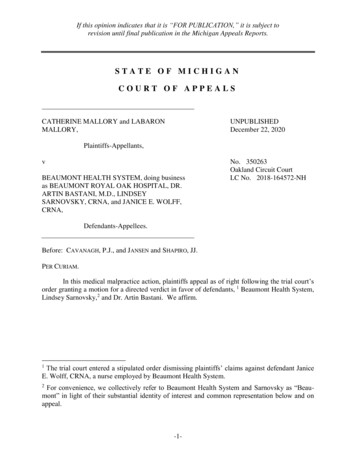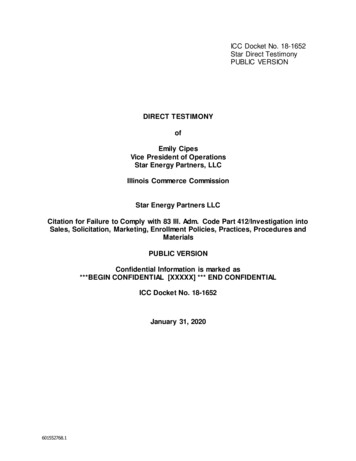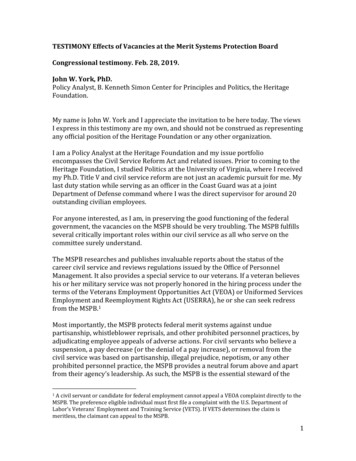
Transcription
TESTIMONY Effects of Vacancies at the Merit Systems Protection BoardCongressional testimony. Feb. 28, 2019.John W. York, PhD.Policy Analyst, B. Kenneth Simon Center for Principles and Politics, the HeritageFoundation.My name is John W. York and I appreciate the invitation to be here today. The viewsI express in this testimony are my own, and should not be construed as representingany official position of the Heritage Foundation or any other organization.I am a Policy Analyst at the Heritage Foundation and my issue portfolioencompasses the Civil Service Reform Act and related issues. Prior to coming to theHeritage Foundation, I studied Politics at the University of Virginia, where I receivedmy Ph.D. Title V and civil service reform are not just an academic pursuit for me. Mylast duty station while serving as an officer in the Coast Guard was at a jointDepartment of Defense command where I was the direct supervisor for around 20outstanding civilian employees.For anyone interested, as I am, in preserving the good functioning of the federalgovernment, the vacancies on the MSPB should be very troubling. The MSPB fulfillsseveral critically important roles within our civil service as all who serve on thecommittee surely understand.The MSPB researches and publishes invaluable reports about the status of thecareer civil service and reviews regulations issued by the Office of PersonnelManagement. It also provides a special service to our veterans. If a veteran believeshis or her military service was not properly honored in the hiring process under theterms of the Veterans Employment Opportunities Act (VEOA) or Uniformed ServicesEmployment and Reemployment Rights Act (USERRA), he or she can seek redressfrom the MSPB.1Most importantly, the MSPB protects federal merit systems against unduepartisanship, whistleblower reprisals, and other prohibited personnel practices, byadjudicating employee appeals of adverse actions. For civil servants who believe asuspension, a pay decrease (or the denial of a pay increase), or removal from thecivil service was based on partisanship, illegal prejudice, nepotism, or any otherprohibited personnel practice, the MSPB provides a neutral forum above and apartfrom their agency’s leadership. As such, the MSPB is the essential steward of theA civil servant or candidate for federal employment cannot appeal a VEOA complaint directly to theMSPB. The preference eligible individual must first file a complaint with the U.S. Department ofLabor's Veterans' Employment and Training Service (VETS). If VETS determines the claim ismeritless, the claimant can appeal to the MSPB.11
merit system and guardian of neutral, non-partisan expertise in the civil service.Whether strict neutrality is possible on the part of civil servants – or anyone – is avexing question. But, even if imperfectly achieved, it is a standard worth vigorouslypursuing.The Impact of the MSPB’s VacanciesThe vacancies on the MSPB, which have left the Board without a quorum, mean theBoard cannot fulfill its vital responsibilities to our civil servants, our veterans, or theAmerican public, whose faith in the neutral professionalism of the civil service hasalready been badly shaken. Without a quorum, the board has been unable make finaldecisions on adverse action appeals, review OPM regulations, or issue officialreports. The Board can order stays only as requested by the Office of SpecialCounsel.We are now in the midst of the longest period that the MSPB has been without aquorum. The ill effects are considerable. The backlog of appeals waiting for theBoard’s review is now nearly 2,000. For some, this is justice denied. For most, this ispunishment delayed. Though the procedural pitfalls are many and the standard ofproof is often high,2 most serious adverse actions are affirmed by the MSPB.3 This isall the more surprising given the multiple levels of review an MSPB appeal faces. Aformal MSPB appeal is first heard by an Administrative Judge (AJ) at a regional orfield office. In 2016,4 28 percent of appeals were dismissed.5 Of the 72 percent of2Depending on the nature of the appeal, different burdens and standards of proof are applied by the MSPB.In cases where an employee was fired for poor performance, the MSPB upholds an agency’s action if thereis “substantial evidence” supporting the agency’s decision. In legal terms, substantial evidence means theamount of evidence that “a reasonable mind might accept as adequate to support a conclusion.” 2 In the caseof a removal for misconduct, the agency must meet the higher evidentiary standard of “preponderance ofthe evidence.” This means over half the evidence must point toward the agency’s conclusion that themisconduct occurred and that the action was warranted. (See:https://www.law.cornell.edu/wex/preponderance of the evidence.) When a former employee alleges thatdiscrimination or whistleblower retaliation was the cause of their removal, the burden of proof is initiallywith the terminated employee. If he or she can demonstrate that, in fact, either one of these was amotivating factor behind their removal, the burden of proof shifts to the agency. In the case of allegedwhistleblower retaliation, an agency must show by “clear and convincing” evidence that it would havetaken the challenging actions in the absence of a protected disclosure. 2 When discrimination is alleged, theagency must demonstrate by a preponderance of the evidence that it would have removed an employee inthe absence of a discriminatory motive. (See: Savage v. Department of the Army ).3The MSPB’s annual reports do not specify the sort of adverse personnel actions that are being appealed.The MSPB can hear appeals of not only removals, but also reductions in grade and suspensions over 14days. While I cannot differentiate between the MSPB’s disposition of these very different adverse actions,there is not a clear reason to expect the MSPB would tend uphold an agency’s decision more or lessdepending on the severity of the adverse action.4I use the 2016 MSPB data instead of the 2017 MSPB data, which we publically available at the time ofwriting because the MSPB has been down to just one member for most of FY 2017.5This does not include the rash of furlough appeals in 2016. A furlough is a cost-saving measure manydepartments undertook in 2016 to stay within their operating budgets. Essentially, employees are placed in2
cases not dismissed, about 66 percent were settled by the agency and appellantbefore an initial decision by the AJ.6 When an AJ actually issued an initial decision,he or she upheld the agency’s adverse action 84 percent of the time. MSPB AJsoverturned an adverse action 11 percent of the time. Another 2 percent of the timean AJ mitigated the agency’s disciplinary action. The MSPB’s main adjudicative body– the three board which is now nearly vacant – only granted about 15 percent ofappeals for final review. In 2016, only 4 percent of initial decisions were reversed,though 89 percent were remanded. 7If history holds, many employees who have won an appeal before one of the MSPB’sAdministrative Judges, but will eventually lose before the Board, are currentlyreceiving “interim relief” – i.e., a salary and other benefits – while they eithercontinue working or languish on administrative leave. All the while, their agencycannot advertise an opening and begin the long process of hiring a new employee. Asmaller – but still sizeable – number of federal employees who cannot afford a legalbattle at the Federal Circuit, wait for their names to be cleared, their pay to berestored, and their careers to resume.Responsibility for MSPB’s incapacity rests primarily with the Senate. PresidentTrump has nominated two qualified attorneys who now wait for confirmation. TheSenate’s unwillingness to fulfill its constitutional obligation to provide advice andconsent regarding the President’s nominees is an endemic, government-wide issue.There are currently over 130 vacancies in the judiciary and over 300 executivebranch nominees awaiting confirmation in the Senate.Had the Senate honored its obligation to provide advice and consent, we would notbe here today discussing the potential conflicts of interest that result from the onlyremaining member of the MSPB concurrently serving as General Counsel to theOffice of Personnel Management. The current Chair’s term would have expired, asscheduled, at the end of February 2018, months before assuming his new position atOPM.Potential Conflicts of Interest on the BoardRegardless of who is to blame, one individual simultaneously serving as both anMSPB chairman and as the General Counsel of OPM creates several potentialconflicts of interest. As mentioned earlier, one of MSPB’s functions is to review OPMregulations. Clearly, OPM’s General Counsel is bound to have an opinion aboutwhether his own office’s regulations are in keeping with merit principles. Second,a temporary status without duties and pay.- See 5 U.S.C. § 7511(a)(5) for the definition of the term. I donot include these appeals because furloughs are not issued for disciplinary aspx?docnumber 1374269&version 1379643&application ACROBAT7Ibid.3
the MSPB hears appeals from retired federal employees regarding the status of theirretirement annuities. The fact that OPM manages the federal employee retirementannuity system makes this yet another clear conflict of interest. Lastly, the Directorof OPM may petition MSPB for reconsideration of a final decision if the Director is“of the opinion that the decision is erroneous and will have a substantial impact onany civil service law, rule, or regulation under the jurisdiction of the Office.”8 It goeswithout saying that OPM is much more likely to defer to MSPB’s decisions if OPM’sown General Counsel had a decisive hand in crafting those decisions.Troubling as these potential conflicts of interest are, none of them have beenrealized. The entire time Mark Robbins has been at both MSPB and OPM, the MSPBhas been without a quorum. Thus, Robbins has been unable to discharge thoseduties that would bring a conflict of interest to a head. He has been unable to renderfinal judgments affecting employee annuities (or any other matter), review OPMregulations, or take any action that OPM might lawfully petition.As Congress considers whether to allow Mr. Robbins to stay on for an additionalyear or accept reappointment for an additional 7-year term, it should also considerhow to address the potential conflicts of interest that could develop if Mr. Robbinscontinues to hold positions at both OPM and MSPB. If Mr. Robbins is allowed to stayon as a stopgap until a new appointment is made, he should vacate his position atMSPB or OPM once the Senate seats any additional Board member. When and if theMSPB again has a quorum, conflicts of interest that are now only theoretical wouldbecome all-too-real if Mr. Robbins continues to serve in both his current roles.Continuing Operations of the MSPB after February 28, 2019If Congress does not take action to assure that there is at least one Senate-confirmedpolitical appointee serving at the MSPB before Mr. Robbins’ tenure is over at the endof this month, the Board will be able to perform only a fraction of its functions.While Administrative Judges can continue to issue initial decisions, petitions forreview of those decisions will continue to pile up. And, as today, no official reportswill be published and regulatory review will not occur.However, limited thusly, a caretaker manager, even one who has not received senateconfirmation, can run the agency without violating the Appointments Clause of theConstitution. An MSPB board member, wielding the full range of his or her powers,is clearly an inferior “Officer of the United States” under the Appointments Clausegiven the Supreme Court’s recent decision in Lucia v. Securities and ExchangeCommission. He or she wields “significant authority” and holds a “continuingposition” – the two hallmarks of an inferior officer requiring senate appointment.But, an acting MSPB agency head – serving when there is no quorum on the Board –is unable to discharge or direct the major duties of the agency. Arguably, such an8See: 5 U.S. Code § 7701(e)4
individual does not possess “significant authority.” Similarly, a caretaker agencyhead who is obligated, or expected, to step down immediately upon theappointment of a Senate-confirmed Board member does not hold a “continuing”position.While the MSPB may be able to continue functioning – albeit at a very low level –when and if Mr. Robbins departs, Congress and the President should take swiftaction to staff the Board’s three positions for the first time since 2015. The Senate’sadvice and consent role does not require it to rubber-stamp every nominee thePresident puts forward. Neither is the Senate permitted to abrogate those dutiesentirely. To do so is to incapacitate the Executive Branch and, perhaps, that is theintent of some in the Senate. But the MSPB’s inability to fulfill its critical functions isjust one demonstration of the collateral damage this tactic can cause.Reforming the Adverse Actions Appeals ProcessThe crisis at the MSPB should occasion a broader conversation about the status ofour civil service and the adverse actions process. Increasingly, a system that wascreated to guard federal employees from partisanship and tests of ideological purity,nepotism and graft, prejudice and reprisals, actually shields them from anyaccountability at all. A system designed to enshrine merit as the sole considerationin personnel decisions, increasingly rewards seniority instead.Nearly every dimension of our civil service system – designed and little changedsince 1978 – is long overdue for reform. The adverse actions process is only onepiece of this broken system, but it is, perhaps, the most glaring deficiency to thepublic at large. Tales of dissolute civil servants who spend their time at workwatching adult videos, auctioning off stolen government property, planningluxurious conferences, or simply doing nothing, are widespread and well-known.9Private sector workers understand that if they behaved in this way, they would beimmediately fired while even the most ostentatious misconduct seems to gounnoticed and unpunished in the federal workforce. Indeed, the federal workforceoffers the highest job security of any sector of the economy.10 Out of a federal nonmilitary workforce of 2.1 million, only 11,046 persons—or 0.5 percent—were firedScott McFarlane, Rick Yarborough, and Steve Jones. “More Cases of Federal Workers Watching Pornon the Job Uncovered.” NBC News Washington. May 9, 2018. Alexander Abad-Santos. “GSA Threw an 800,000 Party and All You Got Was the Bill.” The Atlantic. April 3, 2012; Joe Zimmermann. FormerNIH Employee Sentenced to Six Months in Federal Prison for Stealing Government Property, Selling iton eBay.” Bethesda Magazine. August 6, 2017. Eric Yoder. “Hardly Any Federal Employees are Firedfor Poor Performance. That Could be a Good Thing Report Says.” Washington Post. Oct. 18, 2017.10 U.S. Department of Labor, Bureau of Labor Statistics. Economic News Release. Table 5: Layoffs anddischarges levels and rates by industry and region, seasonally adjusted. Dec. 2017-Dec. 2018. htm#jolts table5.f.295
in fiscal year 2017.11 This low rate of removal does not indicate a workforce with nochaff to cut; it indicates a breakdown in accountability. According to the most recentFederal Employee Viewpoint Survey, just 32 percent of federal employees said theybelieve their agencies take steps to deal with a poor performer who can’t or won’timprove.12Not only does the American public deserve better from the bureaucracy, good civilservants deserve better also. While some federal employees likely take advantage oftheir insulation from accountability, the vast majority of federal workers arecommitted to service and take pride in their work. It is these dedicated publicservants who are asked to pick up the slack for co-workers who cannot, or will not,do their share of the job, and are denied opportunities for advancement by deadweight above them. No one wants to work alongside, or under, someone who has nointerest in their work or, worse, creates a disruptive or dangerous workenvironment. This may be why a majority of federal workers supported threeTrump Administration executive orders – Executive Orders 13836, 13838, and13839 – that made it easier to remove civil servants for misconduct or poorperformance, according to a survey conducted by the Government BusinessCouncil.13Part of the reason for the lack of accountability in the federal workforce is thebyzantine process of appeals that insulates federal employees.14 For the vastmajority of the 2.1 million career civil servants who are not exempted from themerit system protections and procedures, appeals can wind their way through fourseparate agencies – the MSPB, EEOC, OSC, and FLRA – as well as the courts. Even inclear-cut cases, it can take over a year to finally remove a civil servant from thefederal payroll.15While the adverse actions appeals process is overdue for a statutory overhaul, nolimited government conservative should support incapacitating the MSPB byforestalling appointments to the Board. First, as mentioned earlier, the MSPBupholds adverse actions the vast majority of the time. Additionally, the MSPB’sU.S. Office of Personnel Management data available via FedScope. Online:Https://www.fedscope.opm.gov.12 U.S. Office of Personnel Management. 2018 Federal Employee Viewpoint Survey. GovernmentwideManagement Report. Online: t.pdf13 Erich Wagner. “Survey: Half of Feds Support White House Attempts to Ease Firing Process.”Government Executive. June 8, 2018.14 John W. York. Strengthening the Federal Workforce through Increased Accountability. HeritageFoundation Backgrounder No. 3325. July 26, 2018; Office of Personnel Management. ManagingFederal Employees’ Performance Issues or Misconduct. tm15 U.S. Government Accountability Office. Report to the Chairman, Committee on Homeland Securityand Governmental Affairs, U.S. Senate. Improved Supervision and Better Use of Probationary Periodsare Needed to address Substandard Employee Performance. GAO-15-191. February, 2015.116
incapacity does not – and will not – impact all civil servants equally. Unionmembers, after all, do not need to go to the MSPB to protest adverse actions. Theycan elect arbitration and be represented, in many cases, by union representativesworking on “official time” at no cost to them. Meanwhile, hundreds of thousands ofnon-union employees, including executives, managers, law enforcement officers,and other non-bargaining unit employees, who do rely on the MSPB, would be left tochallenge adverse actions in court at their own expense. This two-tiered appealssystem would greatly affect the decision-making process of civil servantsconsidering whether or not to join a federal employee union.Incapacitating the MSPB would also create a perverse incentive to level EEOcomplaints against agency leadership and front-line managers in an effort to gain ahearing before the Equal Employment Opportunity Commission. Nothing can morebadly tarnish the reputation of a federal manager than being accused of racial orreligious bias, sexism or xenophobia. But, with the MSPB incapacitated, linking anadverse action to discrimination may be the only avenue of appeal for a non-unionemployee who cannot afford a court battle. While very few civil servants may makesuch a callous calculus, the incentive to do so is clear and powerful.A final reason to return the MSPB to good functioning is that the sheer complexity ofthe Civil Service Reform Act (CSRA) makes judicial review an inadequate guardagainst prohibited personnel practices. With the MSPB unable to hear appeals fromAdministrative Judges, the court system remains an avenue of appeal for civilservants (but not agencies). But, while Article III judges may be able to handle equalemployment complaints leveled against private sector employers adjudicatingdisputes between federal agencies and employees involves significantly morecomplex statute and regulations.16 As Justice Samuel Alito put it in oral argumentsduring a recent CSRA case, “no ordinary lawyer could read these statutes and figureout what they are supposed to do.”17In effect, judges will ordinarily defer to an executive branch agency’s reasonableinterpretation of the CSRA. This is, in fact, what they do today. From fiscal year2005 to 2015, MSPB averaged a 92 percent affirmation rate at the Federal Circuit foradverse action cases.18 Given the complexity of the CSRA, the Federal Circuit wouldstill likely defer to an agency’s interpretation of statute much of the time. But, if theMSPB did not exist, the agency to which judges would defer would be the veryagency accused of violating merit system principles. This could create a troublingdynamic. With a greater measure of discretion, ideologically polarized agenciescould purify their own ranks of dissenters or skew their hiring processes to usher infellow believers.Anthony W. Perry v. Merit Systems Protection Board. No. 16-399. Oral Argument in the SupremeCourt of the United States. Washington, D.C. Monday, April 17, 2017. Online:https://www.supremecourt.gov/oral arguments/argument transcripts/2016/16-399 3f14.pdf17 Ibid.18 U.S. Merit Systems Protection Board. The Limited Powers of the U.S. Merit Systems Protection Board.Online: https://www.mspb.gov/studies/adverse action report/15 limitedpowers.htm167
Admitting the necessity of a functional MSPB, given the current structure of our civilservice system, should not be read as an endorsement of the status quo. The Boardis an indispensable pillar of a badly outdated structure built forty years ago andbarely remodeled since. The entire architecture of the Civil Service Reform Actshould be reimagined. As a start, Congress should greatly simplify theadministrative appeals process creating a single forum for appeals of adverseagency actions.19 This system existed prior to 1978 and the dissolution of the CivilService Commission (CSC)—and it worked well. A modern iteration of the CSC couldmore expeditiously settle appeals and deliver justice for the appellant and theagency.Creating a single forum for appeals would not change the substantive protectionsthat employees deserve. Each adjudicatory and investigative body involved inadverse action appeals was created to address clear and pressing problems – graft,reprisals against whistleblowers, invidious prejudice, and partisan bias. Real asthese concerns are, splitting responsibility for appeals between several agenciesdoes not guarantee more effective enforcement. The only thing it assures is a lessefficient process.John W. York. Strengthening the Federal Workforce through Increased Accountability. HeritageFoundation Backgrounder No. 3325. July 26, 2018198
all the more surprising given the multiple levels of review an MSPB appeal faces. A formal MSPB appeal is first heard by an Administrative Judge (AJ) at a regional or field office. In 2016,4 28 percent of appeals were dismissed.5 Of the 72 percent of 2 Depending on the nature of the appeal, different burdens and standards of proof are applied .



